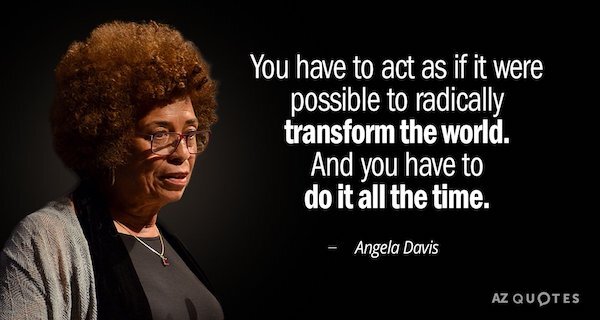This post by Jackie Peterson was so impactful I asked to repost if from her blog:
I’ve been thinking about what to say, where to start. So many more folks in the world have said things more poignantly and eloquently than I ever could. Like most Black folks, I’m exhausted. The last time I was on an airplane was for a family memorial service. Every one of my joyful plans (family vacations, birthday celebrations, professional conferences) has been cancelled, postponed or moved to a virtual meeting. And then, nearly every day I check on the news or social media, another black person has been victimized by white supremacy. There are so many things happening in the world to rage at, to be sad about, to wear me down. But there’s one thing that keeps me perking up my ears despite all of that.
While I agree that some of our greatest work lies in unlearning the vile things white supremacy has us believing (yes, I’m including myself), the biggest challenge ahead of us is imagining - and then creating - a new world. A world that allows everyone to be free, and to reap the benefits of that freedom. This is an unprecedented opportunity for every single person alive right now. About half of the conversations in my house of late have been about the future. What DOES safety look like without police? What DOES a neighborhood with community land ownership look like? What DOES justice look like without our existing criminal justice system? These are things I believe are wholly worth our energy right now. Why? Because unless we all literally feel these things in our bones, nothing will change. The vision and the will to support that vision must precede action.
“There’s power in giving ourselves permission to be the one to imagine the next phase…what am I contributing to what comes next?”
To be clear: I am an abolitionist. As a public history practitioner, I know that reform will always be insufficient. We’ve tried it in so many ways, shapes, and forms that the continued harm done *still* significantly outpaces the gains we’ve won. It’s time to think bigger. It’s time to challenge ourselves and believe that we can build something better. As much as we need to dismantle and analyze every existing institution in our society, we also need to create new systems, new models, and new institutions. And it’s also time to let go of the perfectionism that keeps us from trying in the first place. We can’t be held back by the fear of doing it wrong. We need to be fueled by that beautiful vision so we can keep getting back up again if and when we fail.
For myself, the imagining is the easy part. That freedom - that true freedom - we all talk about wanting? I can describe it. I can see it, smell it, touch it, taste it. What I struggle with is what happens in between. How do we pave the path(s) to get us from here to there? And more importantly, how do we begin sowing the seeds of collective action?
I was talking to my spouse about what it would take it truly live in an equitable society. I posited that a good number of people would need to sacrifice a lot in order to make it work. His immediate response addressed financial sacrifice. But I argued that financial sacrifices from a small percentage of individuals is a short-term solution. Does it need to happen? Yes. I live in a state that has no income tax. The city of Seattle continues to propose an income tax that is, in my opinion, incredibly fair. The starting point for those who would have to pay any income tax is pretty high, and the starting percentage is minimal (less than 5% in most cases). So from that perspective, yes, a sacrifice by those high wage earners is small, maybe even unnoticeable.
But the shift and sacrifice that I believe needs to happen goes well beyond a financial one. It means shifting the way we distribute land. It means prioritizing care of the natural world over our individual needs for convenience and luxury. It means changing how we educate people and the value (or lack of value) we place on certain kinds of education. It means creating a new kind of economy where amassing significant wealth is neither desirable nor incentivized. It means utilizing a new kind of governing and decision-making process that de-centers accumulating or usurping power. It means a radical shift in how we see and value each other.

Individualism and exceptionalism in an American context has held us back from acting in the interest of the collective on a large, national scale. But when it does happen, it’s an extraordinarily beautiful thing. My challenge to everyone right now is to think about how you can better move collectively. How can you begin to make space for others in your dreams and goals and visions? How can you more deeply investigate whether your goals and visions and dreams were implanted by capitalist, ableist, heteronormative, white supremacist society or whether there is a way for them to be in service of the collective? I’m not talking about the whole of humanity either. There’s no way any of us can tackle everything that needs attention in every corner of the world. But we can tackle something that is within a 2-block radius from our homes. Or our kids’ school. Or our 5-person team at work. Or our Saturday volunteer crew. If we start looking at what’s immediately in front of us, we can start to imagine what we can make look a little different, feel a little different. And then we begin to grow a larger practice of collective visioning and collective work.
